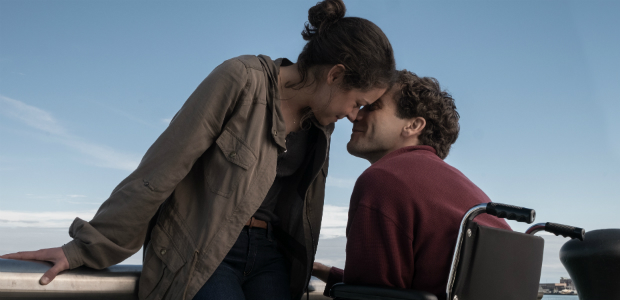Stronger
A sensitive, thoughtful and deeply compassionate interpretation of a fraught moment in our shared history
Plot summary
Jeff Bauman (Jake Gyllenhaal) is a popular local Bostonian recently dumped by his girlfriend Erin (Tatiana Maslany) over his unreliability. In a bid to win her back, he promises to be waiting for her at the finish line of the 2013 Boston marathon. He manages to turn up on the day, but tragedy intervenes before the two are able to reconcile. Losing both his legs in the blast and having his life irreversibly changed in the process, Jeff has to come to terms with his new situation as both victim and symbol of American resilience.

It’s very easy to look upon film adaptations of real-life atrocities with a healthy degree of cynicism. ‘How can you even think about converting tragedy into commercial product?’ you might think, and sometimes this is a perfectly valid question. More often than not, though, such works can shed an illuminating light on the national psyche, whether it’s a nuanced rumination on the complexity of understanding random acts of violence (Elephant), a visceral dramatisation of one of the defining moments in modern history (United 93) or a simple act of providing a human face to an all-too-common headline (Fruitvale Station). Stronger, David Gordon Green’s contribution to the dialogue, takes a story that could easily become mired in cloying gung-ho American flag-waving and, instead, creates something deceptively complex and subtly intelligent.
Of course, Green isn’t completely above a couple of easy wins. There are more than a few instances of eye-rolling sloganeering, such as a final act declaration that Bauman is ‘proof they can’t break us’, and familiar dramatic beats arrive on time and with uninspiring predictability. The overarching narrative sticks rigidly to the ‘inspirational movie of the week’ formula, signposting its act breaks from a mile off and coming precariously close to emotional manipulation, particularly in its closing stretch.
But that isn’t the whole story. From our very first introduction to the charming Bauman (brought to stirring life by Jake Gyllenhaal), it’s clear that there are other forces at work here, and it isn’t until we’re introduced to his extended family (played with gusto by a fantastic supporting cast) that it becomes apparent just what these are. In a recent Q&A, Gyllenhaal spoke of how he realised that he had to do this movie when he got to somewhere around page 12 of the script. ‘I was reading this scene in the hospital after the attack,’ he says, ‘and I found myself laughing.’
The scene he’s talking about, in which the Baumans and their close friends sit in A&E awaiting news of their son’s condition, is bursting with confusing, conflicting feelings, and the viewer goes in fully expecting the waterworks. But it doesn’t take long for these people to descend into petty squabbling, a display of emotions so raw and unexpected that it’s genuinely sideswiping. You find yourself giggling in recognition, fully aware of the cognitive dissonance but unable to do anything about it. It’s a moment of absolute honesty, bursting with oh-so-Bostonian character and refreshingly free of bullshit. And this is carried right through to the very end.
But there’s more still. As well as imbuing the film with a spirit distinct to its locale, it also informs its treatment of the narrative. For all of Green and screenwriter John Pollono’s crowd-pleasing tendencies – and, make no mistake, this is a crowdpleaser – there is an equal and opposite delve into the character to look at the toll that the boundless adulation and platitude-flinging is having on him. This is Stronger’s true ace in the hole: Embracing the confusion and frustration and sheer ugliness that comes to define Bauman’s existence, the film takes a harsh, frequently-unflattering look at the emotional fallout of his internal struggle over finding himself thrust into the spotlight. It’s a ballsy, convincing examination of the media’s penchant – or should that be ‘need’? – to make a hero out of a victim, an act that robs Bauman of his own experience in favour of shoehorning him into a narrative that makes everybody feel better. Everybody, that is, except for him.
Bringing this all home with a ravishingly three-dimensional portrayal is Jake Gyllenhaal. To call his turn ‘revelatory’ would be to ignore that, at this stage in his career, Gyllenhaal turns in sublime work on a pretty-much annual basis, but it still feels like a substantial transformation. Capturing the essence of who Bauman is instead of merely emulating his tics and vocal patterns, the actor flicks between swaggering bravado, wounded vulnerability and volcanic anger without once feeling false or disingenuous. The hero of this story is an inspiration, but he’s also, fundamentally, just a man, and we can see the weight of the expectations that his new label places on his shoulders in every frame.
All of which makes Stronger more – much more – than meets the eye. It’s a sensitive, thoughtful and deeply compassionate interpretation of a fraught moment in our shared history. While it ultimately buckles somewhat to a desire to have its cake and eat it, too, it’s done more than enough by this point to earn the tears it elicits.
Stronger is screening as part of the BFI London Film Festival 2017.











COMMENTS